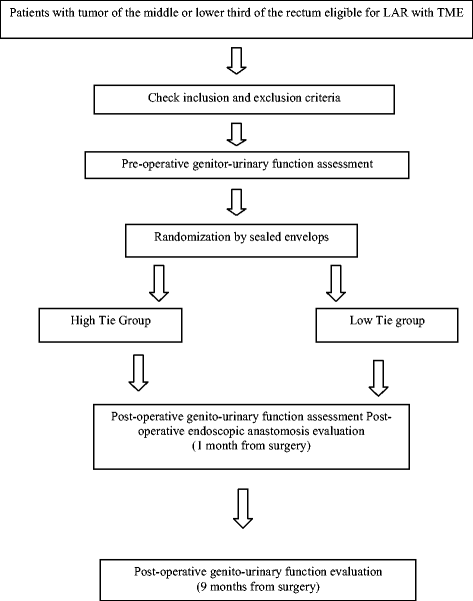"High or low Inferior Mesenteric Artery ligation in Laparoscopic low Anterior Resection: study protocol for a randomized controlled trial" (HIGHLOW trial)
- PMID: 25623323
- PMCID: PMC4311448
- DOI: 10.1186/s13063-014-0537-5
"High or low Inferior Mesenteric Artery ligation in Laparoscopic low Anterior Resection: study protocol for a randomized controlled trial" (HIGHLOW trial)
Abstract
Background: The position of arterial ligation during laparoscopic anterior rectal resection with total mesorectal excision can affect genito-urinary function, bowel function, oncological outcomes, and the incidence of anastomotic leakage. Ligation to the inferior mesenteric artery at the origin or preservation of the left colic artery are both widely performed in rectal surgery. The aim of this study is to compare the incidence of genito-urinary dysfunction, anastomotic leak and oncological outcomes in laparoscopic anterior rectal resection with total mesorectal excision with high or low ligation of the inferior mesenteric artery in a controlled randomized trial.
Methods/design: The HIGHLOW study is a multicenter randomized controlled trial in which patients are randomly assigned to high or low inferior mesenteric artery ligation during laparoscopic anterior rectal resection with total mesorectal excision for rectal cancer. Inclusion criteria are middle or low rectal cancer (0 to 12 cm from the anal verge), an American Society of Anesthesiologists score of I, II, or III, and a body mass index lower than 30. The primary end-point measure is the incidence of post-operative genito-urinary dysfunction. The secondary end-point measure is the incidence of anastomotic leakage in the two groups. A total of 200 patients (100 per arm) will reliably have 84.45 power in estimating a 20% difference in the incidence of genito-urinary dysfunctions. With a group size of 100 patients per arm it is possible to find a significant difference (α = 0.05, β = 0.1555). Allowing for an estimated dropout rate of 5%, the required sample size is 212 patients.
Discussion: The HIGHLOW trial is a randomized multicenter controlled trial that will provide evidence on the merits of the level of arterial ligation during laparoscopic anterior rectal resection with total mesorectal excision in terms of better preserved post-operative genito-urinary function.
Trial registration: ClinicalTrials.gov Identifier: NCT02153801 Protocol Registration Receipt 29/5/2014.
Figures
References
Publication types
MeSH terms
Associated data
LinkOut - more resources
Full Text Sources
Other Literature Sources
Medical
Molecular Biology Databases


